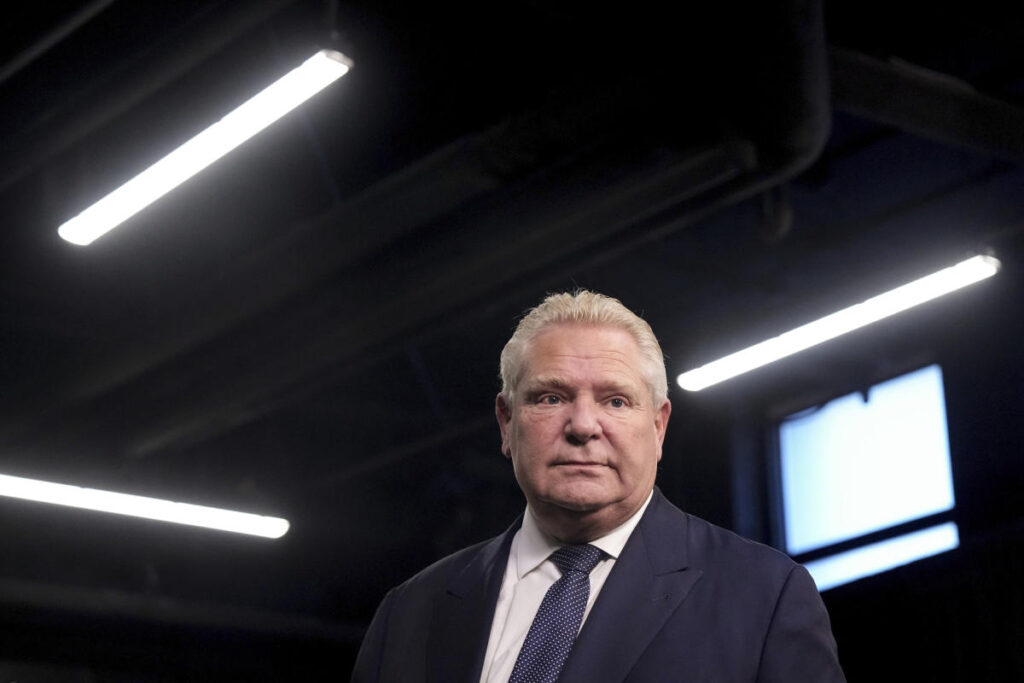Ontario Premier Doug Ford expressed strong concerns regarding President-elect Donald Trump’s proposed imposition of 25% tariffs on all Canadian products, labeling it a potential “disaster” that could negatively impact U.S. stock markets. In a recent interview with The Associated Press, Ford emphasized the deep economic integration between the U.S. and Canada, particularly in the automotive sector, where parts frequently cross the border multiple times before final assembly. He articulated that the proposed tariffs would disrupt these intricate supply chains, inevitably leading to adverse effects on market stability. Ford underscored that many CEOs within various industries share his viewpoint, indicating a widespread apprehension about the consequences of such a trade policy, which he believes would capture Trump’s attention due to its implications for the stock market.
In addition to his concerns about tariffs, Ford also addressed Trump’s plans for mass deportations of undocumented individuals, calling the initiative further alarming. Trump envisions mobilizing significant domestic resources, including the National Guard, to implement what he describes as “the largest mass deportation program in history.” Ford’s administration has a strategy in place to respond to these challenges, ready to dispatch hundreds of provincial police officers to fortify the Canadian side of the border. The premier reiterated his intent to adopt stringent measures by coordinating efforts among local and provincial law enforcement and federal agencies to secure Canada’s borders effectively.
Ford’s apprehensions about the aforementioned tariffs are compounded by Trump’s argument that they are necessary to curb the flow of migrants and drugs, particularly fentanyl, across the borders. However, Ford pointed out that the volume of migrants and the amount of fentanyl crossing the Canadian border is minuscule compared to those flows from Mexico. The statistics speak volumes, as U.S. Customs and Border Patrol reported a stark difference in fentanyl seizures, with only 43 pounds intercepted at the Canadian border in the last fiscal year versus an astonishing 21,100 pounds at the southern border with Mexico. Ford’s acknowledgment of these disparities underscores the misguided nature of Trump’s policy that conflates Canadian and Mexican immigration issues.
The Canadian government is taking proactive steps in response to the looming threat of tariffs. An announcement of a billion-dollar border security plan involves the deployment of advanced surveillance technology including helicopters, drones, and improved ground operations to monitor border activities continuously. Canadian Prime Minister Justin Trudeau emphasized that the plan aims not only to maintain border security but also to tackle organized crime that operates transnationally. The proposed establishment of a joint North American “strike force” to address these issues showcases Canada’s commitment to bolstering collaborative efforts to combat criminal enterprises effectively.
Ford also expressed displeasure over Trudeau’s federal leadership, particularly amidst discernible political turmoil following the resignation of Canada’s finance minister. He insinuated that Trudeau’s leadership is being scrutinized, and he asserted the need for unity among Canada’s provincial leaders in conveying to Americans the critical nature of U.S.-Canada trade relationships. Ford went further by announcing his intent to restrict electricity exports to U.S. states like Michigan and New York, should tariffs be imposed. His stance reflects a readiness to leverage Canada’s significant energy resources to reinforce the economically interdependent nature of U.S.-Canada relations, where a substantial proportion of fuels and minerals vital to the U.S. economy is sourced from Canada.
With the intricate web of trade, energy dependency, and the comparative analysis of migration statistics between the U.S.-Canada and U.S.-Mexico borders, Ford advocates for a bilateral engagement strategy directly with the United States. He articulated a desire to meet with Trump to clarify that Canada is not an adversary but rather an essential trading partner to the U.S. In his discussions with governors from Michigan and New York, Ford noted their understanding of the economic fallout that tariffs could incite. The emphasis is on dispelling misconceptions about trade imbalances and illegal immigration from Canada, reinforcing Ford’s viewpoint that constructive dialogue is necessary to navigate the complexities of North American trade relations effectively.

